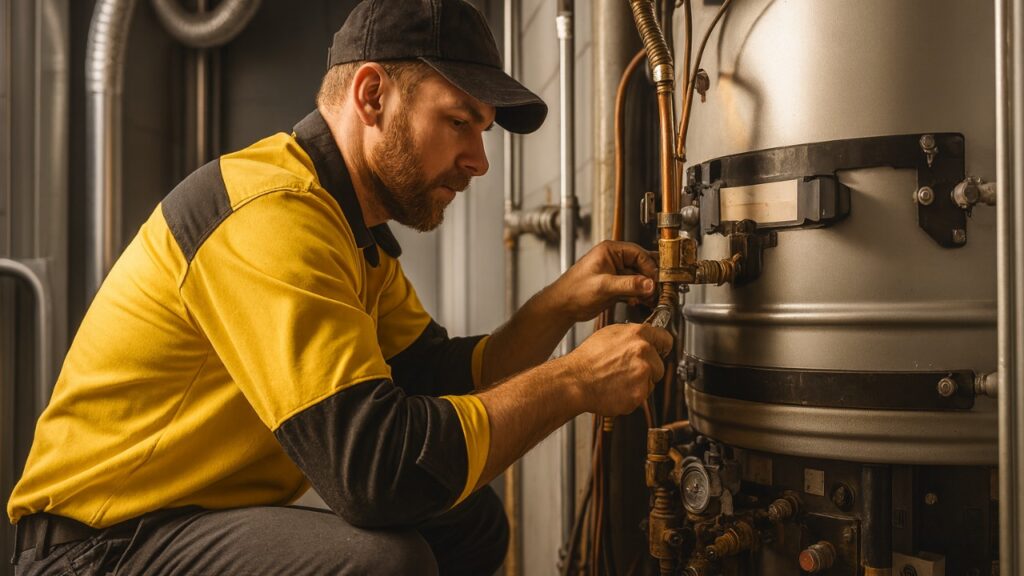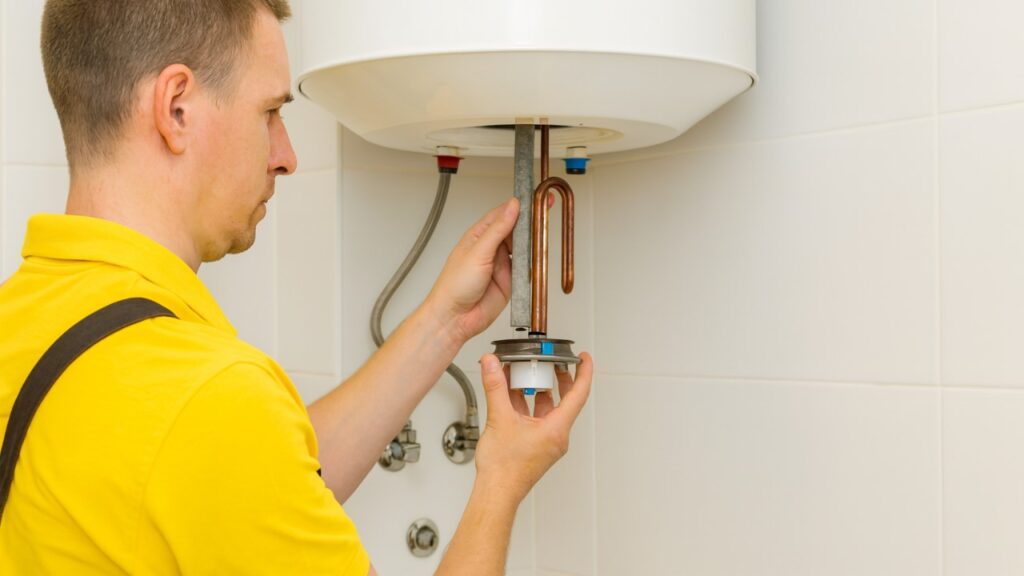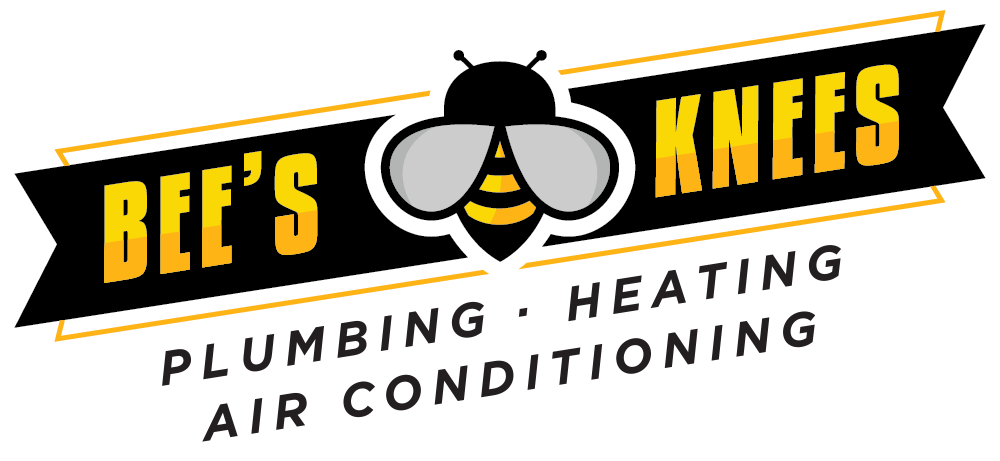
If your showers swing from warm to chilly or your utility bill keeps creeping up, your water heater may be telling you it’s time for an upgrade. Recognizing the early signs can prevent surprise breakdowns, protect your home from leaks, and save money in the long run. This guide is designed for homeowners across Kelowna, Vernon, and the Okanagan, outlining when to repair and when to replace your water heater, plus important insights about average lifespan and insurance coverage in British Columbia.
1. Age: The Most Reliable Predictor
In BC, most conventional tank-style water heaters last between 8–12 years, while tankless systems typically reach 15–20 years with proper maintenance. Okanagan homes often experience mineral buildup from moderately hard water, which can shorten lifespan if the tank isn’t flushed regularly. If your water heater is nearing or past its expected service life, start planning for replacement before a failure causes damage.
Pro Tip: Check the manufacturer label or serial number to find the installation or manufacture date. If it’s unreadable, a licensed technician can confirm it for you.
2. Rusty or Discoloured Hot Water
If your hot water runs brown or rusty while cold water remains clear, internal corrosion could be at play. Sometimes, replacing the anode rod can buy time, but once corrosion breaches the tank wall or discolouration persists, replacement is the safest choice. Corrosion is irreversible once it spreads through the steel lining.
3. Rumbling, Knocking, or Popping Sounds
When sediment accumulates at the bottom of a water heater, it hardens over time and “bakes” during heating cycles. This causes rumbling or popping noises. Flushing the tank may help temporarily, but if the noise returns quickly or worsens, it’s a sign the sediment has solidified. Older units with chronic noise typically waste energy and should be replaced.
4. Water Around the Base (Even Small Puddles)
Any sign of moisture near the base of the heater, other than light condensation, needs immediate attention. Leaks can originate from fittings or valves, which are sometimes repairable. However, a tank that’s leaking due to internal cracks or corrosion cannot be safely repaired. Since even small leaks can escalate into major water damage, prompt replacement is recommended.
5. Inconsistent Hot Water or Reduced Capacity
If your showers turn lukewarm halfway through or you can’t run multiple appliances at once, the tank may have lost effective capacity. Causes include sediment buildup, faulty heating elements, or a shrinking usable volume. Upgrading to a modern, properly sized water heater will restore comfort and often reduce energy costs, especially if your household size has grown since your last installation.
6. Rising Energy Bills Without a Lifestyle Change
Aging water heaters lose efficiency as mineral deposits insulate heating components. This makes the system work harder and longer to achieve the same temperature, raising your gas or electricity bills. Replacing an older unit with a high-efficiency model, tankless system, or heat pump water heater can significantly lower operating costs while improving performance.
7. Frequent Repairs or Persistent Error Codes
If you find yourself calling for service multiple times a year or dealing with repeated error codes on a tankless unit, your system may be reaching the end of its lifespan. Multiple component failures, like igniters, sensors, or valves, are red flags. When repair costs start approaching half the price of a new system, replacement is the more reliable investment.

8. Temperature & Pressure (T&P) Valve Troubles
The T&P valve is a crucial safety device that prevents over-pressurization. If it’s discharging frequently, this may signal overheating, excessive pressure, or internal tank damage. While external factors like high municipal water pressure can sometimes be adjusted, a malfunctioning or unsafe tank should be replaced immediately to prevent hazardous conditions.
9. You’re Considering a Home Upgrade
A renovation, rental suite addition, or growing family can increase your hot water demand. This is the perfect time to upgrade to a larger-capacity tank or consider a tankless model for continuous hot water supply. Proactive replacement also ensures compliance with modern energy-efficiency standards and can improve your home’s resale appeal.
Home Insurance and Water Heater Failures in BC
Many BC homeowners don’t realize that insurance coverage for water heater failures often depends on the unit’s age and maintenance history. Here’s what you should know:
- Sudden and Accidental Leaks: Most home insurance policies cover water damage caused by sudden and accidental failures, including burst water heaters. However, gradual leaks or damage from lack of maintenance are typically excluded.
- Age Limits: Some BC insurers may not cover water damage if the water heater is over 10–12 years old at the time of failure, citing it as “wear and tear.” Proactively replacing your heater before this age can help preserve coverage eligibility.
- Strata Buildings: Many strata corporations across the Okanagan require water heater replacement at or before 10 years of age to reduce flood risk. Unit owners are generally responsible for their own tanks and any resulting damage.
- Documentation Matters: Keep installation dates, maintenance records, and service receipts. These can be essential when filing an insurance claim.
If you’re unsure about your policy terms, it’s worth calling your insurance provider or broker to confirm the specifics before problems arise.
Repair or Replace? A Quick Decision Framework
- Under 7 years old with a single issue: Repair may be more practical.
- Near or past lifespan with multiple issues: Replacement is usually the smarter investment.
- Rising bills or inefficiency: Upgrade to a high-efficiency tank, tankless, or heat pump system.
- Hard water or sediment issues: Consider a model designed for mineral-rich water and schedule annual maintenance to prevent buildup.
Choosing the Right Replacement for Okanagan Homes
- High-Efficiency Tank: Familiar, reliable, and affordable for most households.
- Tankless (On-Demand): Delivers endless hot water, saves space, and reduces energy use when properly sized.
- Heat Pump Water Heater: Offers excellent energy efficiency, particularly for homes with suitable ambient temperatures and proper ventilation.
Because every home’s setup is unique, a licensed technician should evaluate your family’s water usage, recovery needs, and water quality before recommending the best replacement system.
Maintenance Extends Lifespan
Annual service, flushing sediment, inspecting the anode rod, testing safety valves, and checking expansion tanks can extend your water heater’s life, especially in areas like Kelowna and Vernon where water hardness is moderate to high. Preventive maintenance is far cheaper than emergency replacements or water damage repairs.
Ready for Reliable Hot Water in Kelowna, Vernon & Across the Okanagan?
If you’re seeing warning signs like rusty water, noise, leaks, inconsistent temperatures, or rising bills, schedule a professional inspection today. Bee’s Knees Plumbing, Heating and Air Conditioning provides honest assessments and clear options, whether that’s an affordable repair or a high-efficiency replacement that will serve your home for years.
Need dependable hot water and expert advice?
Contact Bee’s Knees Plumbing, Heating and Air Conditioning, your trusted local water heater specialists serving Kelowna, Vernon, and the entire Okanagan Valley.
